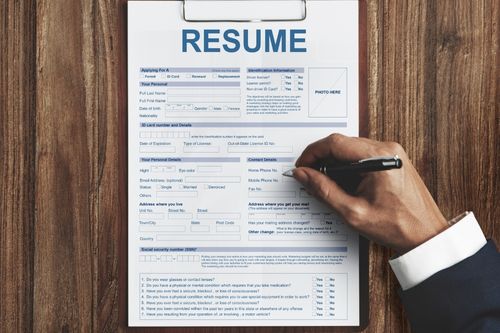Table of Contents
As an aspirant, you must prepare a resume if you are applying to universities or pursuing a career in the academic, scientific, or medical fields. A student resume allows you to highlight your qualifications and differentiate yourself from other applicants. Understanding how to present your credentials effectively can help you write your resume. We define a student resume, discuss what to include, and provide a template and examples for you to use as inspiration in this blog post. Let’s see these student resume writing tips.
What is a student resume?
A student resume is a document that outlines a student’s educational qualifications, skills, experiences, and achievements. Students applying for internships, part-time jobs, or full-time positions after graduation typically use it.
A student’s resume should highlight their academic achievements, such as their GPA, courses taken, and any academic honors or awards they have received. It should also include any relevant work experience, volunteer work, extracurricular activities, and leadership roles the student has held.
A student’s resume should be concise, easy to read, and tailored to the job or internship the student is applying for. It should also be well-organized and visually appealing, using bullet points, headings, and white space to make important information stand out.
Types of student resumes

There are several student resumes, depending on the individual’s experience, education, and goals. Please choose a format for your resume before you begin writing it. Choosing the appropriate format for your background and goals can assist you in effectively organizing your credentials. Here are a few examples of standard resume formats.
Chronological Resume
This type of resume lists a student’s education and work experience in reverse chronological order, starting with the most recent. It’s the most commonly used type of resume and is suitable for students with previous work experience.
Functional Resume
Functional resumes emphasize a student’s skills and abilities rather than work experience. It is an excellent option for students who need more work experience or changing careers.
Combination Resume
This type of resume combines the best elements of chronological and functional resumes. It chronologically lists students’ work experience and highlights their relevant skills and achievements.
Academic Resume

This resume is designed for students applying for academic positions or scholarships. It focuses on student’s academic achievements, research experience, and publications.
Internship Resume
This type of resume is tailored for students applying for internships. It emphasizes relevant coursework, projects, and previous internships or volunteer work.
Ultimately, the type of resume a student should use will depend on their circumstances and goals. Let’s look at some important student resume writing tips, followed by a complete sample resume to assist you in creating your own.
- Start with a header: Begin your resume with your name, contact information (email, phone number), and home address (optional).
- Write a factual, objective statement: This brief statement summarizes your career goals and what you hope to achieve with the job. Keep it concise and tailored to the specific job you are applying for.
- Include your education: List your most recent education first, including your degree, major, and GPA (if it’s above 3.0). Include any academic achievements and awards and extracurricular activities.
- Include any relevant coursework – As a student, you may have little work experience to include when writing a professional resume. Consider adding coursework pertinent to the job or internship you’re applying for to help employers understand the skills you’re developing and why you might be a good fit for the job. In the education section of your resume, you can provide details such as relevant class projects, key topics learned, and individual achievements in a bullet-point list, similar to how you format job responsibilities.
- Highlight your relevant experience: Even if you haven’t had a full-time job before, you may have had part-time or summer jobs, internships, or volunteer experience. Highlight the skills and responsibilities you gained from these experiences relevant to the job you are applying for.
- Showcase your skills: If you have little work experience, you can still highlight your skills. Consider skills like communication, problem-solving, teamwork, and time management. You can also include any technical skills or software programs you are proficient in.
- List your achievements: If you have any notable achievements, such as academic awards, leadership positions, or volunteer work, include them on your resume.
- Keep it concise: Your resume should ideally be one page long, so be selective with the information you include. Use bullet points and brief sentences to make it easy to read.
- Use a professional format – Choose a clean and professional format for your resume that is easy to read and visually appealing.
- Proofread: Before submitting your resume, proofread it carefully for typos or errors. You can also ask a friend or family member to review it. Example -‘ Proficient in Microsoft Office” should be “Proficient in Microsoft Office.’
- Use action verbs – Begin bullet points with action verbs to demonstrate your skills and accomplishments. Example – ‘Led a team of five in creating and implementing a successful fundraising campaign.’
Key takeaways
- A student resume showcases your potential and what you can bring. With these tips, you can create a strong resume highlighting your skills and experiences.
- Chronological, functional, academic, combination, and internship are the five types of resumes.
- Before submitting your resume, proofread it carefully for typos or errors.
- Use action verbs for your resume. It will create a greater impact.
- Your student’s resume should be concise, easy to read, and tailored to the job or internship the student is applying for.
- Do not miss out on mentioning your work experience.
Did you find this blog helpful? Do share your perspectives about the blog in the comments below. Please get in touch with us by clicking here for more information about student resume writing tips. We would be happy to assist you with your queries.
Liked this blog? Read next: Royal Military College of Canada | Programs and campus life
FAQs
Q1. What is the significance of a resume?
Ans. A resume is important because it demonstrates who you are and why you are a good fit for a position.
Q2. What should the length of my resume be?
Ans. While many people adhere to the one-page rule for resume writing, one page may not always be enough to fully demonstrate your competencies and accomplishments.
Q3. What is the distinction between a resume for a recent college graduate and a resume for a postgraduate degree?
Ans. A postgraduate resume will almost certainly include much more advanced educational information as well as more extensive experience in academic programs. A postgraduate is someone who has completed both their undergraduate studies and a Master’s, Ph.D., or Doctoral degree.






